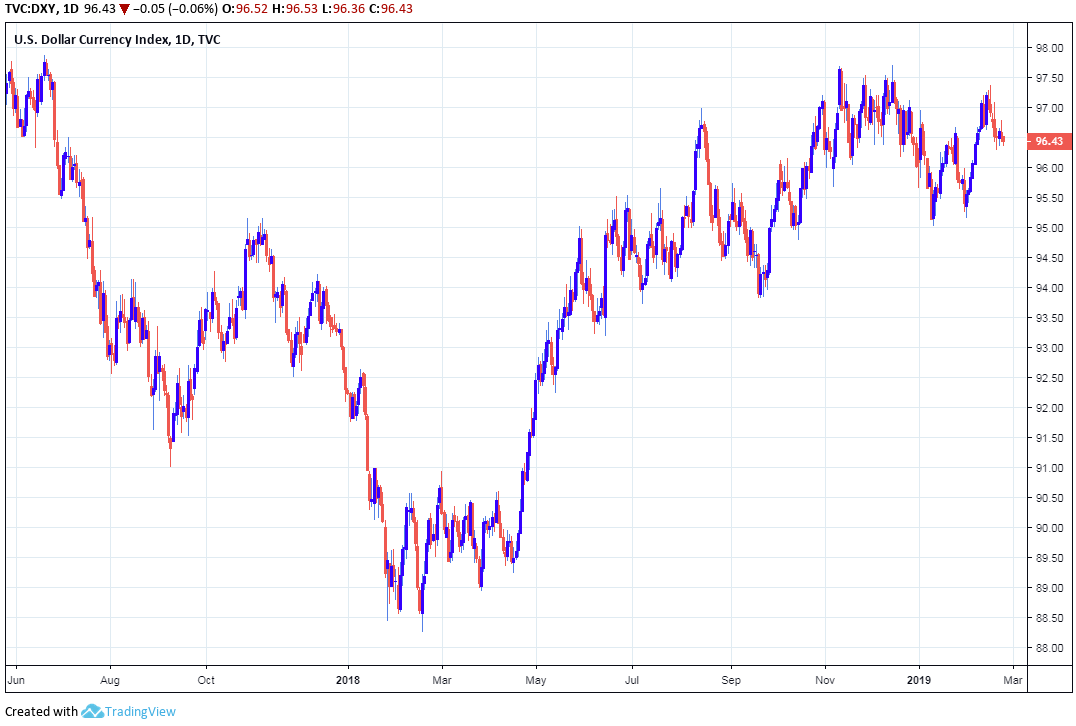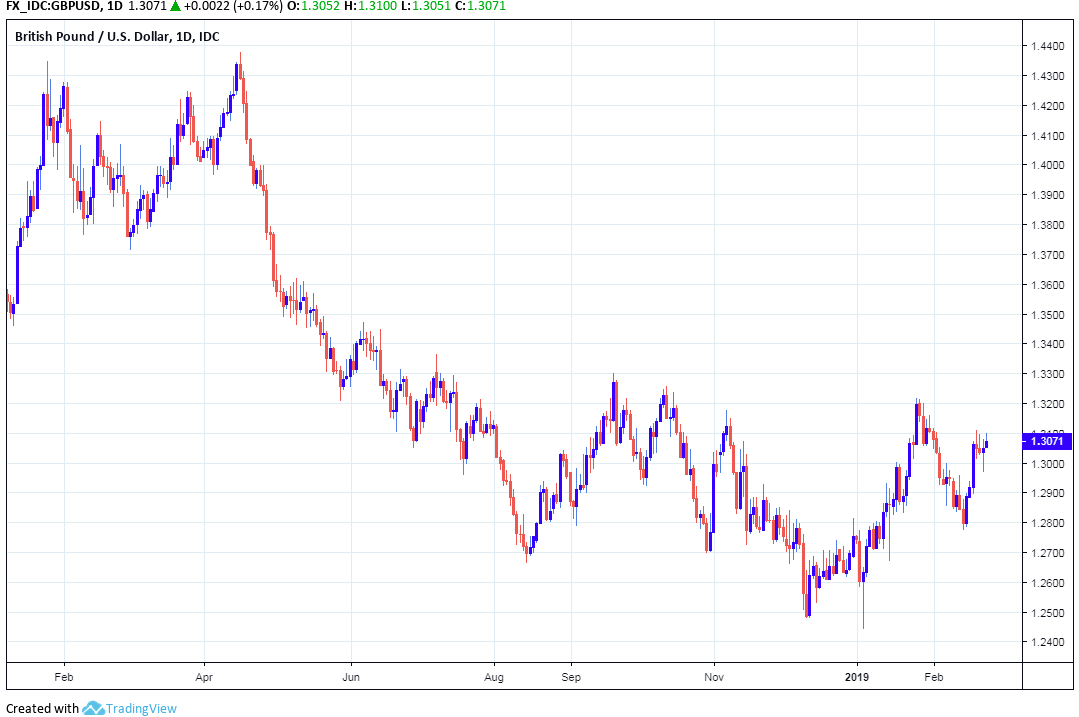The U.S. Dollar: Trump's Trade Truce Met with Scepticism among Analysts
- Written by: James Skinner
 © The White House
© The White House
- USD softens after Trump delays increase of tariffs on Chinese goods.
- Tariff hikes taken off table for time being as parties head toward deal.
- But analysts are sceptical. Rabobank says the real fight is still to come.
The U.S. Dollar softened at the beginning of the new week and risk assets rose after President Donald Trump said tariffs on Chinese goods imported into America will not rise any further next month, although analysts were immediately sceptical of whether the truce will last.
President Trump said in a Twitter post that tariffs on some of China's exports will no longer rise to 25% on March 01, as they have been scheduled to, after negotiators made progress on a range of important issues including intellectual property theft and foreign exchange policy.
Talks are set to continue for a while yet but will eventually conclude with a ceremony at Tump's Mar-a-Lago resort where leaders from the world's two largest economies will sign a memorandum of understanding setting out terms of the future trade relationship.
I am pleased to report that the U.S. has made substantial progress in our trade talks with China on important structural issues including intellectual property protection, technology transfer, agriculture, services, currency, and many other issues. As a result of these very......
— Donald J. Trump (@realDonaldTrump) February 24, 2019
....productive talks, I will be delaying the U.S. increase in tariffs now scheduled for March 1. Assuming both sides make additional progress, we will be planning a Summit for President Xi and myself, at Mar-a-Lago, to conclude an agreement. A very good weekend for U.S. & China!
— Donald J. Trump (@realDonaldTrump) February 24, 2019
The White House has imposed tariffs that range from 10% to 25% on Chinese goods exports to the U.S. that are worth around $250 billion each year.
But it's threatened to raise all those tariffs to 25% and target the remaining $267 bn of Chinese trade with the U.S. if it's "unfair trading practices" aren't resolved.

Above: Dollar Index shown at daily intervals.
Trump asked China to stop subsidizing private industries, to end the practice of forcing American companies to operate as minority-owning joint-venture partners in China and refrain from currency devaluation, among other things.
"Nothing is signed yet; US tariffs aren’t coming down, just not going up; we don’t have any details; and any real deal will be impossible for China to stick to. Apart from that, everything is fine," says Michael Every, a strategist at Rabobank. "Of course, today will be a day for selling USD and buying CNY and/or CNH."
Rabobank's Every says the White House's push to end Chinese subsidisation of domestic companies is effectively a demand for it to change its entire economic and political model overnight, while demands for the Renmimbi to be kept stable are asking the impossible.
Every has warned Rabobank's clients that the deal is likely to provide financial markets and the global economy with 21 months of peace, at most, before another tariff conflict erupts over non-compliance with or failings of the original deal that is due to be signed in the coming weeks.
"In short, despite talk of friendship and partnership and trade, both sides will use the 21- month period to prepare for the next, more serious round of economic/political conflict. As such, this proposed trade deal sounds like the Nasty-Soviet, or Donaldtov-Xibbentrop Pact. The Nazi-Soviet Pact of 1939 saw Berlin and Moscow agree they both hated the liberal world order more than each other," Every says. "22-months later, Operation Barbarossa showed what the real game being played was."

Above: Pound-to-Dollar rate shown at daily intervals.
Monday's announcement came after President Trump met U.S. Trade Representative Robert Lighthizer and China's Vice Premier Liu He in the White House Friday following the latest round of talks.
"The change in the negotiated trade deal to a “trade agreement” instead of “memoranda of understanding” (MOUs) will likely set a higher bar for both parties in terms of compliance/enforcement and in our view, may increase the difficulty in concluding the deal despite the progress being made so far," says Heng Koon How, head of market strategy at UOB Bank in Singapore.
The trade war has hurt the Chinese economy and driven a slowdown in global growth too, particularly in the Eurozone, where there is a large factory sector that does a lot of business with both China and the U.S. It's also roiled global financial markets, but particularly stock markets.
Rabobank's Every and UOB's How are not alone in their scepticism over Monday's headlines. Other analysts also appear to have doubts over whether a deal will actually be reached and, or if a negotiated solution will last once put into practice.
"Nothing has been confirmed and we think it will be impossible for China to conform to US demands on substantive core issues. But that’s for another day," says Sue Trinh, head of Asia FX strategy at RBC Capital Markets. "All eyes on USTR Lighthizer’s testimony in Congress on Weds; needless to say, headline risk over coming days/weeks is acute."
The Dollar index was quoted -0.08% lower at 96.41 during early trading Monday while the Pound-to-Dollar rate was 0.26% higher at 1.3075. The Euro-to-Dollar rate was 0.16% higher at 1.1349 and the USD/JPY rate was 0.05% higher at 110.69.
"The broad value of the USD is trading lower, as multiple currencies undergo a “relief rally” against it. The BBDXY is currently down by 0.17% and we would argue that more losses for the Index are in the offing. Every other G10 currency is trading higher vs the USD thus far today. The JPY is underperforming," says Stephen Gallo, European head of FX strategy at BMO Capital Markets.
Time to move your money? Get 3-5% more currency than your bank would offer by using the services of foreign exchange specialists at RationalFX. A specialist broker can deliver you an exchange rate closer to the real market rate, thereby saving you substantial quantities of currency. Find out more here.
* Advertisement




